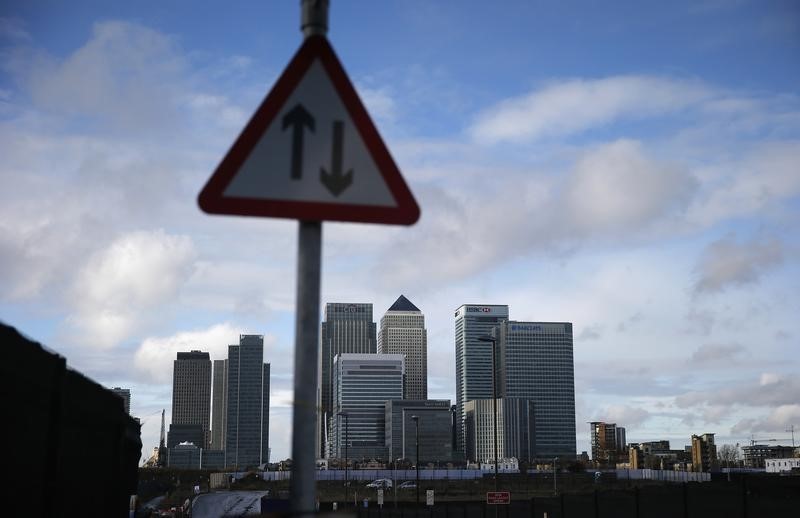By Steve Slater and David Milliken
LONDON (Reuters) - Britain's big banks will need to hold billions of pounds of extra capital when they have to separate their domestic high street banking operations from risky areas, the Bank of England said on Thursday.
New rules to be introduced from 2019 will require British high-street banking operations to be 'ring-fenced' from the rest of the bank, effectively treating it as a separate company. The aim is to better protect taxpayers in the event of a crisis.
The BoE said in a consultation paper on Thursday that the changes would require the affected banks to hold 2.2 billion to 3.3 billion pounds ($3.4-5.1 billion) of extra capital.
That is based on the BoE's estimate of how ring-fencing will reduce group-wide diversification benefits and could result in more concentrated geographic and sector risk, requiring firms to hold more capital in reserve.
The aim is to ensure banks' day-to-day business of running personal and small firms' bank accounts is safe from riskier activities and to ensure the former continues in any crisis.
"Making our firms more resilient has been at the forefront of our post-crisis reform agenda," said BoE deputy governor Andrew Bailey, who heads the central bank's regulatory arm, the Prudential (L:PRU) Regulation Authority (PRA).
The amount of extra capital banks will need is also likely to rise as ring-fenced units will also be told to hold an extra 'systemic risk' buffer, which will be set by another arm of the BoE, its Financial Policy Committee, by the end of May.
Alan Bainbridge, global head of banks at law firm Norton Rose Fulbright, said the proposals were "a clear signal that a 'share-of-group' approach to capital is not going to be viewed as compatible with the ring-fencing purposes" set out in UK legislation.
More positively for the banks, the PRA said the ring-fenced units would be allowed to pay dividends to their parent company.
The ring-fencing rules will affect any bank with more than 25 billion pounds of deposits. That is expected to include - HSBC (L:HSBA), Lloyds (L:LLOY), Barclays (L:BARC), Royal Bank of Scotland (L:RBS), Santander UK (MC:SAN) and Co-operative Bank.
Shares in all the affected listed banks were up by between 0.3 percent and 1.2 percent by 0940 GMT, in line with a firmer European bank index (SX7P).
SHARED CRITICAL FUNCTIONS
Separate proposals to ensure banks can keep running if hit by a crisis were likely to cost banks a one-off amount of 5 percent of their operating costs, and have ongoing annual costs of 3 percent, the BoE said.
For a big bank, this could be equivalent to a one-off cost of 200 million pounds and an annual cost of 120 million pounds.
Banks were concerned that if the rules were applied too strictly lenders would lose control of a major part of their business and would be unable to move capital from the 'ring-fenced' unit to the parent group.
The BoE said ring-fenced units will be able to share most critical functions, such as technology and legal resources, with their parent group, though the new rules could force some firms to change their structure and business models.
"This paper will require large scale restructuring operations at all the major banks," said Rob Moulton, regulatory partner at law firm Ashurst, adding that could include asset disposals to reviews of their outsourcing arrangements.

Banks are aiming to have their ring-fencing structures up and running from the start of 2018, a year ahead of deadline.